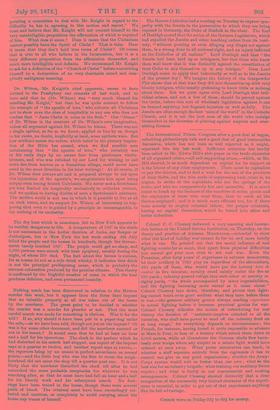Colonel C. C. Chesney delivered a very amusing and instruc-
tive lecture at the United Service Institution, on Thursday, on the theory and practice of Autumn Manceuvres,—intended to show what this kind of holiday war cannot do for us, and more briefly what it can. He pointed out that the moral influence of real fighting counts for so much, that apart from physical difficulties you cannot get your men even to act real war. Even the Prussians, after forty years' of experience in autumn manceuvres, let their artillery in 1869 play on regardless of the skirmishers, 400 yards off them, who would have put the battery hors de combat in five minutes; cavalry stood calmly under the fire at 250 yards ; infantry poured volleys into each other at seventy or eighty yards, "the whole accompanied by many impossibilities, and the fighting becoming more unreal as it came closer." Colonel Chesney lays down, therefore, and proves that fight- ing cannot teach even good soldiers what they have before them in war,—the greatest military genius always needing experience in actual fighting before it becomes practical genius for war. Colonel Chesney ridicules the notion of substituting for real victory the decision of "assistant-umpires attached to all the batteries, who shall have power to send off the infantry fired on at long range," for everything depends on circumstances ; the French, for instance, having found it quite impossible to advance at Mars le Tour, in face of a battery which struck them down at 3,000 metres, while at Gravelotte the German shells flew harm- lessly over troops whom any umpire in a mimic fight would have ordered at once away. What peace manoeuvres can teach, is whether a staff separate entirely from the regiments it has to control can give us any good organisation ; whether the Army- Corps system would suit us better than our own ; what s the best size for an infantry brigade ; what training our auxiliary forces require ; and what is faulty in our commissariat and cooking arrangements. Colonel Chesney showed distinctly that a clear recognition of the necessarily very limited character of the experi- ment is essential, in order to get out of that experiment anything like its full advantage.


































 Previous page
Previous page